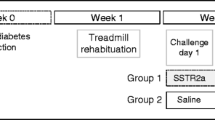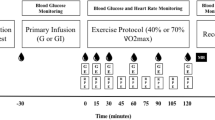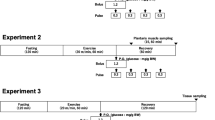Summary
The significance of glucagon for post-exercise glucose homeostasis has been studied in rats fasted overnight. Immediately after exhaustive swimming either rabbit-antiglucagon serum or normal rabbit serum was injected by cardiac puncture. Cardiac blood and samples of liver and muscle tissue were collected before exercise and repeatedly during a 120 min recovery period after exercise. During the post-exercise period plasma glucagon concentrations decreased but remained above pre-exercise values in rats treated with normal serum, while rats treated with antiglucagon serum had excess antibody in plasma throughout. Nevertheless, all other parameters measured showed similar changes in the two groups. Thus after exercise the grossly diminished hepatic glycogen concentrations remained constant, while the decreased blood glucose concentrations were partially restored. Simultaneously concentrations in blood and serum of the main gluconeogenic substrates, lactate, pyruvate, alanine and glycerol declined markedly. During the post-exercise period NEFA concentrations in serum and plasma insulin concentrations remained increased and decreased, respectively, while plasma catecholamines did not differ from basal values. Muscle glycogen concentrations decreased slightly. These findings suggest that in the recovery period after exhaustive exercise the increased glucagon concentrations in plasma do not influence gluconeogenesis.
Similar content being viewed by others
References
Albano, J. D. M., Ekins, R. P., Maritz, G., Turner, R. C.: A sensitive, precise radioimmunoassay of serum insulin relying on charcoal separation of bound and free hormone moieties. Acta endocr. (Kbh.)70, 487–509 (1972)
Baldwin, K. M., Reitman, J. S., Terjung, R. L., Winder, W. W., Holloszy, J. O.: Substrate depletion in different types of muscle and in liver during prolonged running. Amer. J. Physiol.225, 1045–1050 (1973)
Bellinger, L. L., Mendel, V. E.: Hormone and glucose responses to serial cardiac puncture in rats. Proc. Soc. exp. Biol. (N. Y.)148, 5–8 (1975)
Christensen, N. J.: Plasma noradrenaline and adrenaline in patients with thyrotoxicosis and myxedema. Clin. Sci.45, 163–171 (1973)
Claus, T. H., Pilkis, S. J.: Regulation by insulin of gluconeogenesis in isolated rat hepatocytes. Biochim. biophys. Acta (Amst.)421, 246–262 (1976)
Davidson, M. J., Berliner, J. A.: Acute effects of insulin on carbohydrate metabolism in rat liver slices: independence from glucagon. Amer. J. Physiol.227, 79–87 (1974)
Exton, J. H.: Gluconeogenesis. Metabolism21, 945–990 (1972)
Fouchereau-Peron, M., Rancon, F., Freychet, P., Rosselin, G.: Effect of feeding and fasting on the early steps of glucagon action in isolated rat liver cells. Endocrinology98, 755–760 (1976)
Galbo, H., Holst, J. J.: The influence of glucagon on hepatic glycogen mobilization in exercising rats. Pflügers Arch.363, 49–53 (1976)
Galbo, H., Holst, J. J., Christensen, N. J., Hilsted, J.: Glucagon and plasma catecholamines during beta-receptor blockade in exercising man. J. appl. Physiol.40, 855–863 (1976)
Gerich, J. E., Charles, M. A., Grodsky, G. M.: Characterization of the effects of arginine and glucose on glucagon and insulin release from the perfused rat pancreas. J. clin. Invest.54, 833–841 (1974)
Gerich, J. E., Lorenzi, M., Bier, D. M., Tsalikian, E., Schneider, V., Karam, J. H., Forsham, P. H.: Effects of physiologic levels of glucagon and growth hormone on human carbohydrate and lipid metabolism. J. clin. Invest.57, 875–884 (1974)
Holst, J. J., Galbo, H., Richter, E. A.: Neutralization of glucagon by antibodies. (To be submitted)
Huibregtse, C. A., Brunsvold, R. A., Ray, P. D.: Dietary and hormonal regulation of some enzyme activities associated with gluconeogenesis in rabbit liver. Biochim. biophys. Acta (Amst.)421, 228–236 (1976)
Luyckx, A. S., Dresse, A., Cession-Fossion, A., Lefebvre, P. J.: Catecholamines and exercise-induced glucagon and fatty acid mobilization in the rat. Amer. J. Physiol.229, 376–383 (1975)
Olsen, C.: An enzymatic fluorimetric micromethod for the determination of acetoacetate, β-hydroxybutyrate, pyruvate and lactate. Clin. chim. Acta33, 293–300 (1971)
Park, C. R., Exton, J. H.: Glucagon and the metabolism of glucose. In: Glucagon (P. J. Lefebvre and R. H. Unger, eds.) Oxford: Pergamon Press 1972
Sherwin, R. S., Fisher, M., Hendler, R., Felig, P.: Hyperglucagonemia and blood glucose regulation in normal, obese and diabetic subjects. New Engl. J. Med.294, 455–461 (1976)
Wahren, J., Felig, P., Hendler, R., Ahlborg, G.: Glucose and amino acid metabolism during recovery after exercise. J. appl. Physiol.34, 838–845 (1973)
Williamson, D. H.: Methoden der enzymatischen Analyse, pp. 1634–1639. Weinheim: Verlag Chemie 1970
Author information
Authors and Affiliations
Rights and permissions
About this article
Cite this article
Galbo, H., Richter, E.A., Holst, J.J. et al. Lack of influence of glucagon on glucose homeostasis after prolonged exercise in rats. Pflugers Arch. 369, 21–25 (1977). https://doi.org/10.1007/BF00580805
Received:
Issue Date:
DOI: https://doi.org/10.1007/BF00580805




